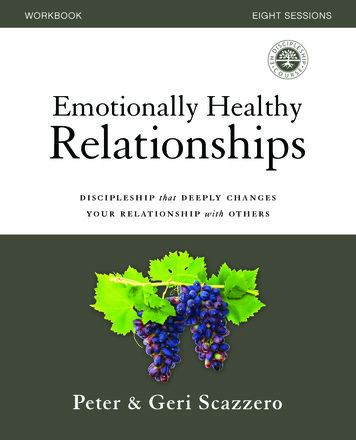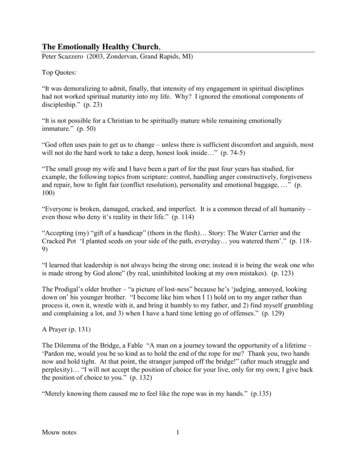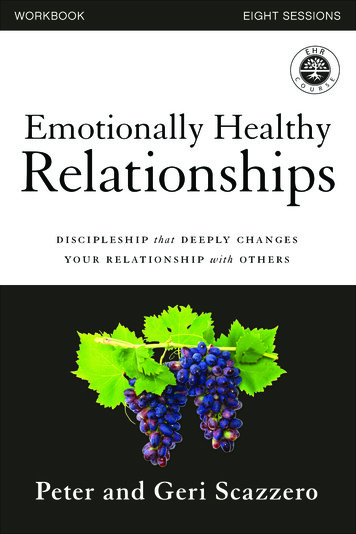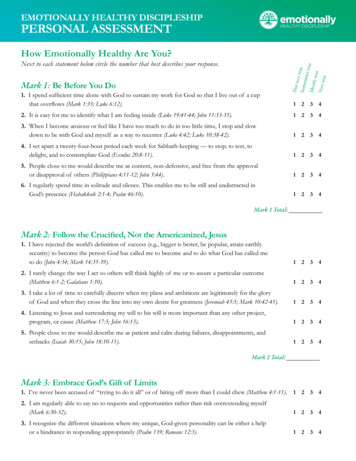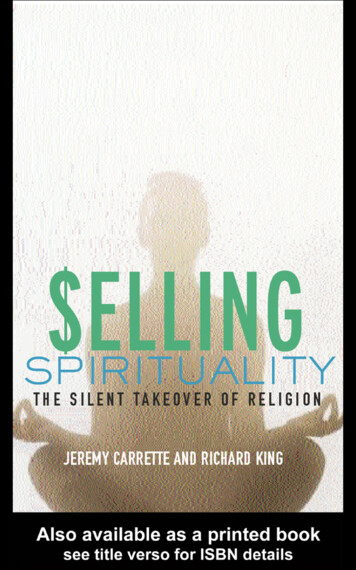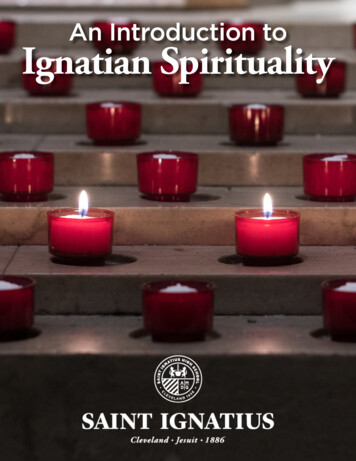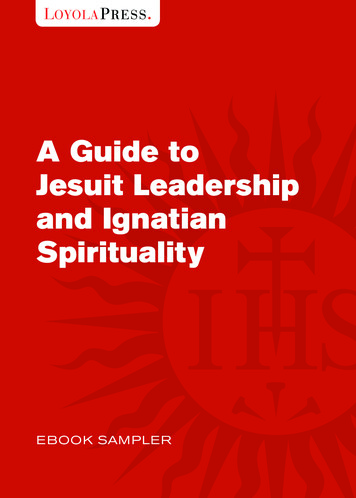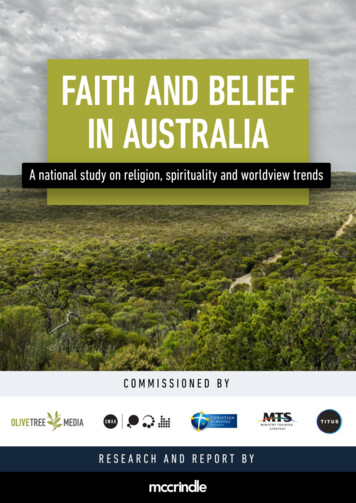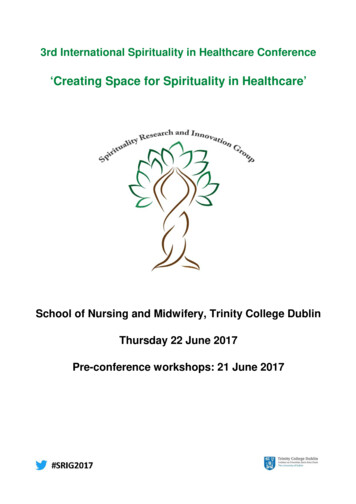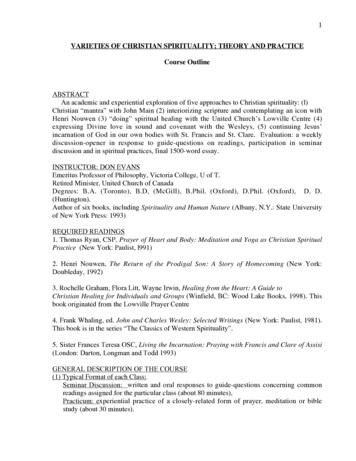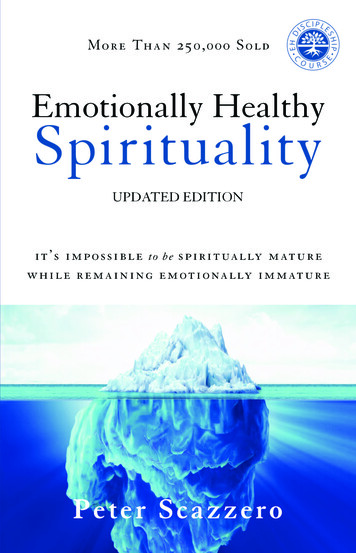
Transcription
Emotionally HealthySpiritualityI T ’ S I M P O S SI BL E t o b e S PI R I T UA L LY M AT U R E ,W H I L E R E M A I N I NG E M O T IONA L LY I M M AT U R EUPDATED EDITIONPeter Scazzero9780310348450 EmotionallyHealthySpirituality int HC.indd 13/1/17 10:58 AM
ZONDERVANEmotionally Healthy Spirituality, Updated EditionCopyright 2014, 2017 by Peter ScazzeroRequests for information should be addressed to:Zondervan, 3900 Sparks Dr. SE, Grand Rapids, Michigan 49546ISBN 978-0-310-34845-0 (hardcover)ISBN 978-0-310-34849-8 (softcover)ISBN 978-0-310-34857-3 (ebook)All Scripture quotations, unless otherwise indicated, are taken from The Holy Bible, NewInternational Version , NIV . Copyright 1973, 1978, 1984, 2011 by Biblica, Inc. Used bypermission of Zondervan. All rights reserved worldwide. www.Zondervan.com. The “NIV” and“New International Version” are trademarks registered in the United States Patent and TrademarkOffice by Biblica, Inc. Scripture quotations marked ESV are taken from the ESV (The Holy Bible, English StandardVersion ). Copyright 2001 by Crossway, a publishing ministry of Good News Publishers. Usedby permission. All rights reserved.Scripture quotations marked MSG [or The Message] are taken from The Message. Copyright byEugene H. Peterson 1993, 1994, 1995, 1996, 2000, 2001, 2002. Used by permission of NavPress.All rights reserved. Represented by Tyndale House Publishers, Inc.Any Internet addresses (websites, blogs, etc.) and telephone numbers in this book are offered as aresource. They are not intended in any way to be or imply an endorsement by Zondervan, nor doesZondervan vouch for the content of these sites and numbers for the life of this book.All rights reserved. No part of this publication may be reproduced, stored in a retrieval system,or transmitted in any form or by any means— electronic, mechanical, photocopy, recording, orany other— except for brief quotations in printed reviews, without the prior permission of thepublisher.Cover photo: Shutterstock / leonello calvettiAuthor photos: Orlando SuazoInterior illustration: 123RF / Ion PopaInterior design: Beth ShageneFirst Printing February 2017 / Printed in the United States of America9780310348450 EmotionallyHealthySpirituality int HC.indd 212/27/17 8:48 AM
ContentsINTRODUCTION . . . . . . . . . . . . . . . . . . . . . . . . . . . . . . . . . . . . 5CHAPTER 1. . . . . . . . . . . . . . . . . . . . . . . . . . . . . . . . . . . . . . . . 9The Problem of Emotionally Unhealthy SpiritualitySomething Is DesperatelyWrongCHAPTER 2. . . . . . . . . . . . . . . . . . . . . . . . . . . . . . . . . . . . . . . 39Know Yourself That You May Know GodBecomingYour Authentic SelfCHAPTER 3. . . . . . . . . . . . . . . . . . . . . . . . . . . . . . . . . . . . . . . 71Going Back in Order to Go ForwardBreaking the Power of the PastCHAPTER 4. . . . . . . . . . . . . . . . . . . . . . . . . . . . . . . . . . . . . . . 97Journey through the WallLetting Go of Power and ControlCHAPTER 5. . . . . . . . . . . . . . . . . . . . . . . . . . . . . . . . . . . . . . 117Enlarge Your Soul through Grief and LossSurrendering toYour LimitsCHAPTER 6. . . . . . . . . . . . . . . . . . . . . . . . . . . . . . . . . . . . . . 139Discover the Rhythms of the Daily Office and SabbathStopping to Breathe the Air of Eternity9780310348450 EmotionallyHealthySpirituality int HC.indd 33/1/17 10:58 AM
CHAPTER 7. . . . . . . . . . . . . . . . . . . . . . . . . . . . . . . . . . . . . . 165Grow into an Emotionally Mature AdultLearning New Skills to LoveWellCHAPTER 8. . . . . . . . . . . . . . . . . . . . . . . . . . . . . . . . . . . . . . 189Go the Next Step to Develop a “Rule of Life”Loving Christ Above All ElseExcerpt from Emotionally Healthy SpiritualityDay by Day . . . . . . . . . . . . . . . . . . . . . . . . . . . . . . . . . . . . . . .207APPENDIX A:Defining Emotional Health and ContemplativeSpirituality. . . . . . . . . . . . . . . . . . . . . . . . . . . . . . . . . . . . . . .211APPENDIX B:APPENDIX C: The Prayer of Examen . . . . . . . . . . . . . . . . . . . . . . .217NOTES. . . . . . . . . . . . . . . . . . . . . . . . . . . . . . . . . . . . . . . . . 219ACKNOWLEDGMENTS . . . . . . . . . . . . . . . . . . . . . . . . . . . . . . 229ABOUT THE AUTHOR . . . . . . . . . . . . . . . . . . . . . . . . . . . . . . . 231CHECKLIST FOR THE EMOTIONALLY HEALTHY (EH)SPIRITUALITY COURSE . . . . . . . . . . . . . . . . . . . . . . . . . . . 2409780310348450 EmotionallyHealthySpirituality int HC.indd 43/1/17 10:58 AM
IntroductionWhen Emotionally Healthy Spirituality (EHS) was first published morethan a decade ago, I hoped it would help people but I never imaginedthat the message it contained would resonate so deeply with readersacross all denominational and theological lines and with churchesaround the world— from Africa to Asia, to Europe, to South andCentral America, to the Mideast, to Australia and New Zealand, toNorth America. Nor could I have imagined that it would develop intoThe Emotionally Healthy (EH) Spirituality Course— with a workbook, aDVD, and an eight- week devotional book— or that churches would useit to implement EHS principles into their own DNA and discipleshipculture.When I am asked why I think the content of the book has spreadso rapidly and found such a receptive audience, I often begin myresponse by describing how EHS was lived long before it was written.As a church, we have been practicing, refining, and absorbing theprinciples in this book for more than two decades. Fifteen hundredadults from seventy- three nations stream through our doors eachweek. This provides a very unique context for practicing this materialin a community that represents the global church.The other thing I point out is how EHS differs from more traditional approaches to discipleship. Many churches follow an approachto discipleship and ministry impact that looks something like this.59780310348450 EmotionallyHealthySpirituality int HC.indd 53/1/17 10:58 AM
Emotionally Healthy SpiritualityWhile the traditional approach typically focuses on providinghelpful classes, engaging small groups, and ample opportunities toserve, the level of change in people’s lives tends to be minimal. So isthe impact.In contrast, Emotionally Healthy Spirituality books andresources are designed to help people experience beneath- the- surfacetransformation— spiritually and emotionally. Why? Because deeplychanged people have a more powerful and more sustainable impactin the world. Changed people change the world.As a result of EHS, the transformation we experienced as achurch— members and leaders— has led us to frontiers of life in theHoly Spirit that we could not have imagined. One recent example ismy own leadership transition. After serving as senior pastor at NewLife Fellowship for twenty- six years, and after a four- and- a- half- year69780310348450 EmotionallyHealthySpirituality int HC.indd 63/1/17 10:58 AM
Introductionsuccession process,1 I shifted my role from senior pastor to teachingpastor/pastor- at- large. This has been a wonderful expansion and deepening for New Life. Other examples include the global impact ourchurch has around the world, the creative outreach EHS has unleashedin people’s witness to Christ in the marketplace, and the change ithas produced in the culture and community in churches as a whole.Now it’s your turn. I believe with all my heart that the principlesand practices that have changed my life and lives in churches all aroundthe world can change your life as well.This book (along with the EH Spirituality Course) is your invitation to a deeper and wider relationship with Jesus Christ, requiringyou to journey into the unknown, much like Abraham did when heleft his comfortable home in Ur. The combination of emotional healthand contemplative spirituality— the heart of the message found onthese pages— will unleash a revolution into the deep places of yourlife. This revolution will, in turn, transform all your relationships.So I invite you to read these pages prayerfully . . . thoughtfully . . .slowly. Pause when you need to in order to absorb the glimpses of Godand yourself that the Holy Spirit provides along the way. Write downhow God speaks to you. When I read an edifying book God uses tospeak to me, I write inside the back cover a few sentences about eachinsight along with the page number. This way I can go back later andeasily review what God said for additional insight and direction. Youhave my permission to write all over the margins of this book, or youmay want to keep a journal as you read.Pray the prayers at the end of each chapter— slowly. Don’t hurry.Each chapter could easily have been expanded into its own book. Thereis a lot of material here to chew on.Let me also encourage you to use the Checklist for the EmotionallyHealthy (EH) Spirituality Course found on the last page of the book.This will guide you, step by step, to implement the truths contained79780310348450 EmotionallyHealthySpirituality int HC.indd 73/1/17 10:58 AM
Emotionally Healthy Spiritualityherein. Fill it out as you move through the Course and, when completed,go to emotionallyhealthy.org to receive your certificate of completion.Most importantly, I encourage you to savor and cherish the LordJesus Christ as you meet him in these pages. The goal is to grow inyour experience of Jesus, not merely add to your head knowledgeabout him.John of the Cross, in the introduction of his book The Living Flameof Love, noted that everything he wrote about his life with God was “asfar from the reality as is a painting from the living object represented.”2Nonetheless, he ventured to write what he did know. In a similar way,I invite you to receive what you read here as a painting that directsyou to a richer, more authentic encounter with the living God inChrist. The real fruit of this book will be measured by the positivechanges you begin to experience in your relationships— with Jesus,with others, and with yourself.A lack of emotional health in the early years of my ministry almostcost me everything— my marriage, my family, my work, and my ownwell- being. I am thankful to God for his mercy. This mercy enabledme not only to survive but to enjoy a richness and joy in the Christianlife that I had given up believing was possible. If you are hungry forGod to transform you as well as those around you, I invite you tocontinue reading.89780310348450 EmotionallyHealthySpirituality int HC.indd 83/1/17 10:58 AM
CH A P T E R 1The Problem of EmotionallyUnhealthy SpiritualitySomething Is Desperately WrongChristian spirituality, without an integration of emotional health, canbe deadly— to yourself, your relationship with God, and the peoplearound you. I know. Having lived half my adult life this way, I havemore personal illustrations than I care to recount.The following is one I wish I could forget.Faith and the PoolI met John and Susan while speaking at another church. They wereexcited and enthusiastic about visiting New Life Fellowship Church inQueens where I was pastor. On a hot, humid July Sunday, they madethe long, arduous drive from Connecticut, with all the predictabletraffic, to sit through our three services. Between the second andthird service John pulled me aside to let me know they hoped to getsome time to talk with Geri and me.I was exhausted. But my greater concern was what their pastor, a99780310348450 EmotionallyHealthySpirituality int HC.indd 93/1/17 10:58 AM
Emotionally Healthy Spiritualityfriend of mine, would think. What would they say to him if I simplysent them home? What might they say about me?So I lied.“Sure, I would love to have you for a late- afternoon lunch. I’msure Geri would too!”Geri, in her desire to be a “good pastor’s wife,” agreed to the lunchwhen I called, even though she too would have preferred to say no.John, Susan, and I arrived home about three o’clock in the afternoon.Within a few minutes, the four of us sat down to eat.Then John began to talk . . . and talk . . . and talk. Susan said nothing.Geri and I would occasionally glance at each other. We felt wehad to give him time. But how much?John continued to talk . . . and talk . . . and talk.I couldn’t interrupt him. He was sharing with such intensity aboutGod, his life, his new opportunities at work. Oh God, I want to be lovingand kind, but how much is enough? I wondered to myself as I pretended tolisten. I was angry. Then I felt guilty about my anger. I wanted Johnand Susan to think of Geri and me as hospitable and gracious. Whydidn’t he give his wife a chance to say something? Or us?Finally, Susan took a bathroom break. John excused himself tomake a quick phone call. Geri spoke up once we were alone.“Pete, I can’t believe you did this!” she mumbled in an annoyedvoice. “I haven’t seen you. The kids haven’t seen you.”I put my head down and slumped my shoulders, hoping my humility before her would evoke mercy.It didn’t.Susan returned from the bathroom and John continued talking.I hated sitting at that kitchen table.“I hope I’m not talking too much,” John said unsuspectingly.“No, of course not.” I continued to lie on our behalf. I assuredhim, “It’s great having you here.”109780310348450 EmotionallyHealthySpirituality int HC.indd 103/1/17 10:58 AM
The Problem of Emotionally Unhealthy SpiritualityGeri was silent next to me. I did not want to look over.After another hour, Geri blurted out during a rare pause, “I haven’theard from Faith in a while.” Faith was our three- year- old daughter.John continued talking as if Geri hadn’t said a word. Geri andI exchanged glances again and continued pretending to listen, occasionally stretching our necks to look outside the room.Oh, I’m sure everything is all right, I convinced myself.Geri, however, began to look very upset. Her face revealed tension, worry, and impatience. I could tell her mind was racing throughoptions of where Faith might be.The house was way too quiet. John continued talking.Finally, Geri excused herself with what I could tell was an annoyedtone: “I have to go and check on our daughter.”She darted down to the basement. No Faith. The bedrooms. NoFaith. The living and dining rooms. No Faith.Frantically, she ran back into the kitchen. “Pete! Oh my God, Ican’t find her. She’s not here!”Horror gripped us both as our eyes locked for a nanosecond. Wewere both pondering the unthinkable: the pool!Despite the fact that we lived in a two- family, semi- attachedhouse with little space, we did have a small three- foot- high pool inour backyard for relief from the hot New York City summers. We ranto the backyard . . . and saw our worst fears realized.There stood Faith in the middle of the pool with her back tous— our three- year- old daughter, naked, barely standing on tiptoeswith water up to her chin, almost in her mouth.At that moment I felt ourselves age five years.“Faith. Don’t move!” Geri yelled as we ran to pull her out of thepool. Somehow Faith had let herself up and down the ladder intothe water without slipping. And she had kept herself standing on hertiptoes in the pool for who knows how long!119780310348450 EmotionallyHealthySpirituality int HC.indd 113/1/17 10:58 AM
Emotionally Healthy SpiritualityIf she had faltered, Geri and I would have been burying our daughter. Geri and I were badly shaken— for days. I shudder even today asI write these words.The sad truth about this incident is that nothing changed insideus. That would take five more years, a lot more pain, and a few moreclose calls.How could I, along with Geri, have been so negligent? I look backin embarrassment at how untruthful and immature I acted with Johnand Susan, with God, with myself! John wasn’t the problem; I was.Externally, I had appeared kind, gracious, and patient, when inwardlyI was nothing like that. I so wanted to present a polished image as agood Christian that I cut myself off from what was going on withinmyself. Unconsciously I had been thinking: I hope I am a good- enoughChristian. Will this couple like us? Will they think we are okay? Will John givea good report of his visit to my pastor friend?Pretending was safer than honesty and vulnerability.The reality was that my discipleship and spirituality had nottouched a number of deep internal wounds and sin patterns— especially those ugly ones that emerged behind the closed doors ofour home during trials, disagreements, conflicts, and setbacks.I was stuck at an immature level of spiritual and emotional development. And my then- present way of living the Christian life was nottransforming the deep places in my life.And because of that, Faith almost died. Something was dreadfullywrong with my spirituality— but what?Growing Up Emotionally UndevelopedVery, very few people emerge out of their families of origin emotionally whole or mature. In my early years of ministry, I believed thepower of Christ could break any curse, so I barely gave any thought129780310348450 EmotionallyHealthySpirituality int HC.indd 123/1/17 10:58 AM
The Problem of Emotionally Unhealthy Spiritualityto how the home I’d left long ago might still be shaping me. Afterall, didn’t Paul teach in 2 Corinthians 5:17 that when you become aChristian, old things pass away and all things become new? But crisistaught me I had to go back and understand what those old things werein order for them to begin passing away.My Italian- American family, like all families, was cracked andbroken. My parents were children of immigrants and sacrificed themselves for their four children to enjoy the American dream. My dad, abaker by trade, worked endless hours, first in a New York City Italianpastry shop owned by my grandfather and later for a large bakingdistributor. His one overriding goal was for his children to study,graduate from college, and “make something of their lives.”My mom struggled with clinical depression and an emotionallyunavailable husband. Raised under an abusive father, she suffocatedunder the weight of raising her four children alone. Her married life,like her childhood, was marked by sadness and loneliness.My siblings and I emerged out of that environment scarred.We were emotionally underdeveloped and starved for affection andattention. We each left home for college, trying unsuccessfully notto look back.From the outside our home, like so many others, appeared okay.It seemed better, at least, than most of my friends’ situations. Thehouse of cards, however, came tumbling down when I was sixteen. Myolder brother broke an invisible rule of our family by disobeying myfather and quitting college. Even worse, he announced that Reverendand Mrs. Moon, founders of the Unification Church, were the trueparents of humankind. For the next ten years he was declared deadand forbidden to return home. My parents were ashamed and crushed.They drew back from extended family and friends. The pressure andstress of his dramatic leaving exposed the large craters and holes inour family functioning. We splintered further apart.139780310348450 EmotionallyHealthySpirituality int HC.indd 133/1/17 10:58 AM
Emotionally Healthy SpiritualityIt would take us almost two decades to begin recovering.What is perhaps most tragic is that my dad’s spirituality and loyalinvolvement in his church (he was the one member of our familywith any spark of genuine faith) had little impact on his marriage andparenting. The way he functioned as a father, husband, and employeereflected his culture and family of origin rather than the new familyof Jesus.My family is undoubtedly different from yours. But one thingI’ve learned after thirty years of working closely with families is this:your family, like mine, is also marked by the consequences of thedisobedience of our first parents as described in Genesis 3. Shame,secrets, lies, betrayals, relationship breakdowns, disappointments, andunresolved longings for unconditional love lie beneath the veneer ofeven the most respectable families.Coming to Faith in ChristDisillusioned and unsure of God’s existence, by the age of thirteen Ihad left the church, convinced it was irrelevant to “real life.” It wasthrough a Christian concert in a small church and a Bible study on ouruniversity campus that, by God’s grace, I became a Christian. I wasnineteen. The enormity of God’s love in Christ overwhelmed me. Iimmediately began a passionate quest to know this living Jesus whohad revealed himself to me.For the next seventeen years, I plunged headfirst into my newfound evangelical/charismatic tradition, absorbing every drop ofdiscipleship and spirituality I could. I prayed and read Scripture. Iconsumed Christian books. I participated in small groups and attendedchurch regularly. I learned about spiritual disciplines. I served eagerlywith my gifts. I gave away money freely. I shared my faith with anyonewho would listen.149780310348450 EmotionallyHealthySpirituality int HC.indd 143/1/17 10:58 AM
The Problem of Emotionally Unhealthy SpiritualityFollowing college graduation, I taught high school English forone year and then worked for three years on staff with InterVarsityChristian Fellowship, a Christian ministry serving college students.Eventually, this led me to Princeton and Gordon- Conwell Theologicalseminaries, one year in Costa Rica to learn Spanish, and the plantingof a multiethnic church in Queens, New York.For those first seventeen years as a devoted follower of Christ,however, the emotional aspects of my humanity remained largelyuntouched. They were rarely talked about in Sunday school classes,small groups, or any church leadership settings. In fact, the phrase“emotional aspects of my humanity” seemed to belong in a professionalcounselor’s vocabulary, not the vocabulary of the church.Trying Different Approaches to DiscipleshipJust as my ministry leadership seemed to be reaching full swing,Geri, my wife, slowly began to protest that something was desperatelywrong— wrong with me and wrong with the church. I knew she mightbe right so I kept trying to implement different discipleship emphasesthat, to a certain degree, helped me. My conversation with myselfwent something like this:“More Bible study, Pete. That will change people. Their mindswill be renewed. Changed lives will follow.”“No. It is body life. Get everyone in deeper levels of community,in small groups. That will do it!”“Pete, remember, deep change requires the power of the Spirit.That can only come through prayer. Spend more time in prayer yourself and schedule more prayer meetings at New Life. God doesn’tmove unless we pray.”“No, these are spiritual warfare issues. The reason people aren’treally changing is you are not confronting the demonic powers in and159780310348450 EmotionallyHealthySpirituality int HC.indd 153/1/17 10:58 AM
Emotionally Healthy Spiritualityaround them. Apply Scripture and pray in Jesus’ authority for peopleto be set free from the evil one.”“Worship. That’s it. If people will only soak in the presence ofGod in worship, that will work.”“Remember Christ’s words from Matthew 25:40. We meet Christwhen we give freely to ‘the least of these brothers and sisters of mine,’those sick, unknown, in prison. Get them involved in serving amongthe poor; they will change.”“No, Pete, you need people who hear God in an exceptional wayand have prophetic insight. They will finally break the unseen chainsaround people.”“Enough, Pete. People don’t really understand the grace of Godin the gospel. Our standing before God is based on Jesus’ record andperformance, not our own. It is his righteousness, not ours! Pound itinto their heads every day, as Luther said, and they’ll change!”There is biblical truth in each of these perspectives. I believe all ofthem have a place in our spiritual journey and development. You, nodoubt, have experienced God and his presence through one or moreof these in your walk with Christ.The problem, however, is that you inevitably find, as I did,something is still missing. In fact, the spirituality of most currentdiscipleship models often only adds an additional protective layeragainst people growing up emotionally. When people have authenticspiritual experiences— such as worship, prayer, Bible studies, andfellowship— they mistakenly believe they are doing fine, even if theirrelational life is fractured and their interior world is disordered. Theirapparent “progress” then provides a spiritual reason for not doing thehard work of maturing.They are deceived.I know. I lived that way for almost seventeen years. Because of169780310348450 EmotionallyHealthySpirituality int HC.indd 163/1/17 10:58 AM
The Problem of Emotionally Unhealthy Spiritualitythe spiritual growth in certain areas of my life and in those aroundme, I ignored the glaring signs of emotional immaturity that wereeverywhere in and around me.In our more honest moments, most of us will admit that, muchlike an iceberg, we are made up of deep layers that exist well beneathour day- to- day awareness. As the following illustration shows, onlyabout 10 percent of an iceberg is visible. This 10 percent representsthe ways we conduct ourselves and the changes we make that otherscan see. We are nicer people, more respectful. We attend church andparticipate regularly. We “clean up our lives” somewhat by addressingany issues with alcohol and drugs to foul language to illicit behaviorand beyond. We begin to pray and share Christ with others.But the roots of who we are continue unchanged and unmoved.Contemporary spiritual formation and discipleship models addresssome of that 90 percent below the surface. The problem is that alarge portion (see below the dotted line) remains untouched by JesusChrist until there is a serious engagement with what I call “emotionallyhealthy spirituality.”179780310348450 EmotionallyHealthySpirituality int HC.indd 173/1/17 10:58 AM
Emotionally Healthy SpiritualityGetting My Attention through PainThree things finally dragged me, kicking and screaming, to open upto the notion of emotionally healthy spirituality.First, I was not experiencing the joy or contentment Scripturepromises us in Christ. I was unhappy, frustrated, overworked, andharried. God had brought me into the Christian life with the offer, “Myyoke is easy and my burden is light” (Matthew 11:30), an invitationto a free and abundant life. But I wasn’t feeling it.A yoke, in ancient Palestine, was made of wood, handmade tofit perfectly to the neck and shoulders of oxen and prevent chafing orcutting. In the same way, Jesus’ assurance of a “light, easy yoke” canbe translated as follows: “I have crafted a life for you, a yoke for youto wear that perfectly fits who you are. It is light and easy, I promise.”The reality, however, is that after many years as an active Christian,I felt exhausted and in need of a break. My life was lived more out ofreaction to what other people did or might do or what they thoughtor might think about me. I knew in my head we were to live to pleaseGod. Living like that was another matter. Jesus’ yoke felt burdensome.Second, I was angry, bitter, and depressed. For five years I hadattempted to do the work of two or three people. We had two servicesin English in the morning and one in the afternoon in Spanish. Ipreached at all of them. When my associate in our afternoon Spanishcongregation left the church with two hundred of the two hundredand fifty members to start his own church, I found myself hating him.I tried, without success, to forgive him.I experienced the growing tension of a double life— preaching loveand forgiveness on Sundays and cursing alone in my car on Mondays.The gap between my beliefs and my experience now revealed itselfwith terrifying clarity.Third, Geri was lonely, tired of functioning as a single mom with189780310348450 EmotionallyHealthySpirituality int HC.indd 183/1/17 10:58 AM
The Problem of Emotionally Unhealthy Spiritualityour four daughters. She wanted more from our marriage and grewfrustrated enough to confront me. She had finally come to a placewhere she would not accept my excuses, delays, or avoidant behavior.She had nothing else to lose.Late one evening, as I was sitting on our bed reading, she enteredthe room and calmly informed me: “Pete, I’d be happier single thanmarried to you. I am getting off this roller coaster. I love you but refuseto live this way anymore. I have waited. . . . I have tried talking toyou. You aren’t listening. I can’t change you. That is up to you. But Iam getting on with my life.”She was resolute: “Oh, yes, by the way, the church you pastor? Iquit. Your leadership isn’t worth following.”For a brief moment, I understood why people murder those theylove. She had exposed my nakedness. A part of me wanted to strangleher. Mostly I felt deeply ashamed. It was almost too much for myweak ego to bear.Nonetheless, this was probably the most loving thing Geri hasdone for me in our entire marriage. While she could not articulate ityet at that point, she realized something vital: emotional health andspiritual maturity are inseparable. It is not possible to be spirituallymature while remaining emotionally immature.While I sincerely loved Jesus Christ and believed many truths abouthim, I was an emotional infant unwilling to look at my immaturity.Geri’s leaving the church pushed me over the brink to lookbeneath the surface of my iceberg to depths that were, until this time,too frightening to consider. Pain has an amazing ability to open us tonew truth and to get us moving. I finally acknowledged the painfultruth that huge areas of my life (or iceberg, if you prefer) remaineduntouched by Jesus Christ. My biblical knowledge, leadership position, seminary training, experience, and skills had not changed thatembarrassing reality.199780310348450 EmotionallyHealthySpirituality int HC.indd 193/1/17 10:58 AM
Emotionally Healthy SpiritualityI was engaged in what I now characterize as “emotionally unhealthyspirituality.” I was the senior pastor of a church, but I longed to escapeand
Emotionally Healthy Spirituality 6 While the traditional approach typically focuses on providing helpful classes, engaging small groups, and ample opportunities to serve, the level of change in people's lives tends to be minimal. So is the impact. In contrast, Emotionally Healthy Spirituality books and
